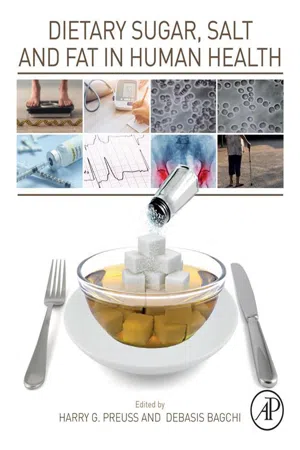
Dietary Sugar, Salt and Fat in Human Health
Harry G. Preuss,Debasis Bagchi
- 680 pages
- English
- ePUB (mobile friendly)
- Available on iOS & Android
Dietary Sugar, Salt and Fat in Human Health
Harry G. Preuss,Debasis Bagchi
About This Book
Divided into four main sections, Dietary Sugar, Salt and Fat in Human Health explores the biochemical, pharmacological and medicinal aspects related to the overindulgence of dietary salt, sugar, and fat, along with possible remedies.
Beginning with a general overview, the text outlines aspects associated with advancing age and human physiology, such as different aspects of insulin resistance, the advancing age phenomenon, central fat accumulation and metabolic perturbations and the role of the modern Western diet and the influence of dietary sugar, salt, and fat, with particular focus on their relation to multiple biochemical pathophysiological pathways. The second section of the book focuses on the roles of dietary sugars and their correlation with the chronic disease epidemic, with an emphasis on carbohydrate metabolism and its biochemistry, GI absorption, the glycemic index and the influence of fructose. The historical background of dietary sugars is discussed alongside Atkin's hypothesis, and an overview of the correlation between dietary fibre and the glycemic index, including a chapter on sugar addiction. Section three contains an exhaustive review of the influence of dietary salt and its diverse mechanistic aspects, including salt-sensitive hypertension, contribution of two steroid receptor pathways, vascular NO, intrarenal RAAS system and angiotensin. The fourth section highlights the biochemistry of dietary saturated, polyunsaturated and trans fat and its influence on human health and various diseases, and further explores NAFLD and gender specific problems. Chapters in this section also investigate the benefits of the Mediterranean diet as well as myths related to cholesterol.
Collected and carefully organized for researchers in nutrition, physiology, epidemiology, or sensory science, this book will also benefit general practitioners, surgeons, nurses, health professionals and practitioners, and students studying the role of diet in cardiometabolic disorders and disease.
- Demonstrates how a healthy lifestyle impacts lifespan
- Provides a general overview and outlines aspects associated with advancing age and human physiology
- Focuses on the roles of dietary sugars and their correlation with the chronic disease epidemic
- Contains an exhaustive review of the influence of dietary salt and its diverse mechanistic aspects
- Highlights the biochemistry of dietary saturated, polyunsaturated and trans fat and its influence on human health and various diseases
Frequently asked questions
Information
Influence of dietary sugars on blood pressure regulation: historical, epidemiological, laboratory, and clinical considerations
Abstract
- • Modestly elevated blood pressure (BP) readings, even in the so-called normal range, provide serious cardiovascular complications throughout the world.
- • Among dietary constituents, just excess intake of table salt (NaCl) for the most part and to a lesser extent lack of sufficient dietary potassium are consistently linked to BP elevations.
- • Nevertheless, studies assessing cardiac dynamics among various populations suggest a significant role for other dietary factors in increasing BP.
- • At present, avoiding consumption of rapidly absorbed sugars, particularly sucrose, high fructose corn syrup, and fructose, is being recognized as possible means to prevent/treat/ameliorate elevated BP and avoid associated cardiovascular perturbations.
- • The deleterious effects emanating from dietary sugars appear to depend largely upon development of insulin resistance (IR)—an inadequate response to circulating insulin by muscles, fat, and liver.
- • In support, significant positive correlations between fasting blood glucose values and circulating insulin levels that are reasonable estimates of IR with BP have been consistently found in clinical evaluations.
- • An amplified interaction between common table salt and dietary sugars to raise BP has been reported and should be prudently considered when planning the most advantageous prevention and treatment regimens to ameliorate the global crisis arising from damaging pressure levels.
Keywords
Abbreviations
10.1 Introduction
Table of contents
- Cover image
- Title page
- Table of Contents
- Copyright
- Dedication
- List of contributors
- Preface
- General background
- Food behavior, food addiction and metabolic syndrome
- Dietary sugar and health
- Overindulgence of dietary salt
- Dietary fat and cholesterol
- Dietary fiber, ketogenic diets, and benefits
- Appendix. Commentary: From the Editor’s desk Reflecting on changes in nutritional risk factors over time
- Index